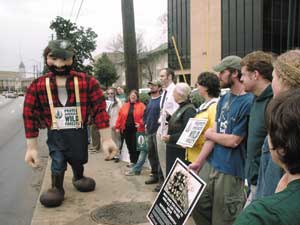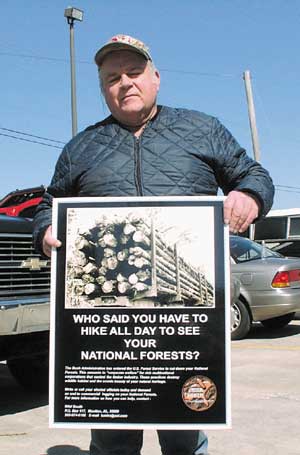|
|
Forcing the Forest Service to 'Come Out and Play'
On February 27, Club organizer Kate Smolski and I set out on a five-state tour, the culmination of the Southern Appalachian Highlands Ecoregion mailing of last December to 20,000 Sierra Club members in the region (Alabama, Georgia, South Carolina, Tennessee, and Virginia). We targeted members in states where national forest plans are undergoing revision, calling on the regional forester in Atlanta to reinstate "Alternative C" and consider a no-commercial-logging alternative in the plan revisions. The mailing and subsequent tabling generated more than 5,000 postcard responses for us to deliver to decision-makers.

Borrowing Paul Bunyan: The larger-than-life logger, on loan from the Club's North Star (Minnesota) Chapter, struts his stuff in front of the U.S. Forest Service Regional Office on busy Peachtree Street in downtown Atlanta. Bunyan joined Club activists in five southern states to promote a no-commercial-logging alternative for area national forests.
|
We mounted all 5,000 postcards on 80 display boards and planned to deliver the cards personally to the Forest Service Regional Office in Atlanta. Once the cards were mounted, we thought "Why not take the display to the forest supervisors' offices in the other states as well?"
So we did, working closely with Sierra Club leaders, volunteers, and our coalition partners, including Wild Alabama/Wild South, Cherokee Forest Voices, Virginia Forest Watch, Shenandoah Ecosystem Defense Group, South Carolina Forest Watch, Savannah River Keepers, and Students for Environmental Awareness at the University of Georgia. Organizer Peggie Griffin was of enormous help in Alabama, as were chapter staff Dell Isham in South Carolina and Bryan Hager in Georgia.
We went to Montgomery, Alabama, on February 28; Cleveland, Tennessee, on March 3; Roanoke, Virginia, on March 4; Columbia, South Carolina, on March 5; and then Gainesville and Atlanta, Georgia, on March 6. As a final touch, we called the North Star (Minnesota) Chapter, and asked them to ship us their eight-foot-tall Paul Bunyan street puppet. He spoke at each of our events as a "reformed logger" now working with the Sierra Club to promote restoration as an alternative to extraction.

Telling It Like It Is: Kirk Johnson holds one of our coalition partner's signs at the Cherokee National Forest event in Cleveland, Tennessee.
|
The events were a huge success. While attendance was limited because we had to get to five states in five days and hold the events midday, we still averaged around 20 folks at each event and got significant media coverage in each market, especially from television stations. (We can thank Paul Bunyan for that.)
In Alabama we were covered by two television stations and one statewide radio outlet; in Tennessee by three television networks and two print media; in Virginia by four network television stations and the Western Virginia Public Radio outlet, as well as print coverage in the Roanoke Times; in South Carolina by one television station, one university print and radio outlet, the state radio news network, and the state newspaper; and in Georgia by a local newspaper in Gainesville.
On the day of our first event in Montgomery, we found out that the Forest Service Regional Office had e-mailed a press release to Forest Supervisors' offices across the region, priming them for the media they knew we'd have present at the events. In the e-mail, the Forest Service directly addressed the Sierra Club's concerns about the removal of Alternative C, the no-logging alternative, from detailed consideration-the first public statement the Forest Service has made on the Alternative C issue since it took this action last summer.
"Today, the Forest Service accepts this additional input from citizens of the Sierra Club," the release said, and then went on to state that in order to give Alternative C the "appropriate level of analysis and consideration" it will "further examine each concern enumerated in these letters as [we] review comments."
The commitment the Forest Service made in this obviously hastily thrown-together press release is less significant than the fact that they made a release at all. The Sierra Club is specifically mentioned twice in the release. They knew we were coming, and thought they had best be ready for us. From my conversations with numerous public affairs officers at each supervisor's office, I learned that the local offices were in contact with the regional office, which evidently thought it prudent to have a specific release ready for each office.
Our success is due to the great work of Club volunteers, staff, and our allied organizations in supporting the events, helping to release media advisories, following up with press calls, and helping distribute the subsequent releases we prepared. Once again, the "citizens of the Sierra Club" forced the decision-makers to come out and play.
Up to Top
|